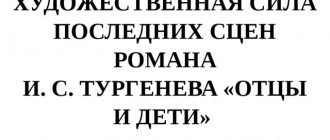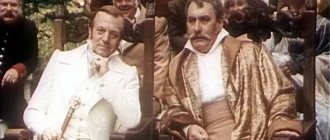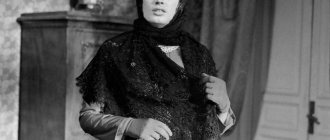Home / Migration Law / Why Did Dostoevsky Consider the Epilogue of Crime and Punishment to be the Main Part of His Novel?
Team of lawyers - Russlidsurist writes to you. We tell you our experience and knowledge, which in total we have more than 43 years, this allows us to give the correct answers to what may be required in various life situations and at the moment we will consider - Why Dostoevsky Considered the Epilogue of Crime and Punishment the Main Part of His Romana?. If in your case you need an instant response in your city or online, then, of course, in this case it is better to use the help on the website. Or ask in the comments people who have previously encountered the same question.
Attention please, the data may be out of date, laws are updated and supplemented very quickly, so we are looking forward to your subscription to us on social media. networks so that you are aware of all updates.
The epilogue of Dostoevsky’s novel “Crime and Punishment” occupies a special place in the work. It is permeated with the light of spirituality and hope for a wonderful future. In the epilogue, Dostoevsky talks about how the lives of the heroes of the novel developed in the future, and at the same time gives hope for all people living on earth for the atonement of sins.
Option 2
Under the influence of the environment and Sonya’s quiet, unobtrusive love, enormous changes occur in Raskolnikov’s soul. He had a goal in life, he realized how wrong he was in trying to achieve justice by killing a worthless person, in his opinion. He realized that human life is priceless, and decided to “atone for the suffering” of the beautiful girl with “endless love.”
Essay Epilogue in the novel Crime and Punishment
The reader finds himself in the setting of a Siberian prison, where the investigation of the case is underway. We learn some important facts about the old woman's murder. In particular, that the main character hid a wallet and things from the pawnbroker’s apartment under a stone. But he didn’t take any of this, didn’t spend any money. Rodin described some episodes of the crime in detail, without missing the slightest detail, but could not remember anything about others. From this, the investigation concluded that Rodion was temporarily insanity. The combination of these facts became the basis for the judges to soften the final verdict - Raskolnikov was sentenced to 8 years of hard labor.
You may be interested ==> Change of Documents After Marriage Not at the Place of Registration
Due to the state of detachment in which Raskolnikov was in prison, much passed by his attention. Over time, he clearly realized that the convicts, one of whom he himself was, did not consider him “one of their own” at all.
Prologue and epilogue in literature
Prologue and epilogue (from the Greek prologos - preface; epilogos - afterword). If you look at the prologue and epilogue from the top of the plot, they appear at its very periphery - like the foot of a mountain. However, good books are read differently, at least not from the middle. The first and last pages are no less significant for us than the climactic ones.
The prologue and epilogue that matured in ancient Greek art are a product of the decomposition of syncretism and the memory of it. “Songs of a lyrical-epic nature seem to be the first natural separation from the connection between choir and ritual,” noted A. Veselovsky. On the contrary, playwrights have been enjoying lyrical and epic support for a long time, realizing, however, that this is support from the outside. The rapid rotation of the dramatic collision inevitably displaced the direct message and relationship beyond the boundaries of the plot action. This is how the prologue and epilogue arose.
Prologue and epilogue in drama
In ancient drama, the prologue is a historical, everyday or mythological prehistory of future events, performed primarily by a choir, and the epilogue establishes the final balance of power and sums up the moral and philosophical conclusion of the work.
Gradually, there was a steady reduction in the prologue and epilogue, weakening their role. If in most of Aeschylus' tragedies the conclusions and especially the introductions were detailed and multi-stage, then the ancient Roman playwrights sometimes made do with only direct stage action. Increasingly, it is recognized as self-sufficient.
It seems that Shakespeare still has a lot of epilogues, and yet the great writer clearly doubts their necessity. Subsequently, in their usual static form, epilogues disappear for a long time from dramatic works, and prologues mainly become extra-stage: “prefaces”, “pre-notifications”, “open letters”, “analysis” of the plays of Corneille, Beaumarchais, Hugo were already supplied at the time of publication.
Prologue and epilogue in the epic
The fate of the prologue and epilogue in the epic was different. In traditional epic genres (epic, heroic poem, fairy tale), lyrical introductions and conclusions are kept to a minimum: in the “Song of the Nibelungs,” for example, two stanzas, the first and the last, were enough for them. The chorus and outcome are also short in Russian epics. They perform a kind of ornamental or ritual function: “the gate is open - the gate is closed.” More often than not, the narrator simply did not need a prologue and epilogue. The story is closed on an event; it consistently sets out one fate, one incident.
In the epic, the prologue and epilogue begin to take hold along with the development of individual creativity. In an educational novel (by Fielding, Goldsmith, Chernyshevsky), in such a didactic genre as a fable, the author strives to give a precise direction for the reader’s perception, to clearly establish his own thought.
In the 19th century, lyrics increasingly invaded the genre system of the epic: the story develops with its various deviations from the main narrative line, an essay appears, and the poem turns into a lyric-epic formation. It is in opposition to it that such plot components as the prologue and epilogue are now determined. Here the writer expresses something that cannot be expressed through a description of events.
An example of a poetic epilogue is the final lyrical digression about the three-bird in the first volume of Gogol’s “Dead Souls,” and a prologue is the author’s introduction from Pushkin’s “The Bronze Horseman.” Of course, there are other forms of prologue: the main action can be preceded by landscapes (as, for example, in Chekhov’s “Gooseberries”), a generalizing image-symbol (the “Tatar” flower in L. Tolstoy’s “Hadji Murad”), a parable (“Data Tutashkhia » Ch. Amirejibi). In the epic works of the 19th-20th centuries. prologue - a short overture. It sets the tone, tunes the reader to a certain wave.
The epilogue is used even more often and, perhaps, more consciously in epic prose. Especially in the Russian classic novel. Most of the major works of Dostoevsky, Turgenev, and Goncharov’s “Ordinary History” end with an epilogue. Let us note that exceptional digressions—such as “Part Two” of the “Epilogue” from Tolstoy’s “War and Peace”—are comparatively rare here. Usually in novel epilogues we see the same familiar faces. And yet these are not just subsequent stories. The leap through space and time was made by realist writers in order to reveal the complexity of character, the unpredictability of the command of a person who found himself in a new environment.
The metamorphoses that occur at the end of the epilogue with Rudin are striking. Throughout the entire novel, he remains inactive, rants and reflects, and then dies on the Parisian barricades with a red banner in his hand. The epilogue significantly changes the reader's existing ideas; it leads to the idea that what prevented Rudin from decisively expressing himself was, obviously, not nature, but circumstances.
Prologues and epilogues in lyrics
In the literature of the last two centuries, the prologue and epilogue are the monopoly of the epic genres, but they can also be found in dramatic works (in “Faust” by Goethe, “The King in the Square” by Blok, “The Good Man of Szechwan” by Brecht), and even in lyric poetry - and not only in lyrical books and cycles, but also in individual poems.
Poetic forms are canonical, and the innovative poet uses them in his own way in the fight against the inertia of reader perception. Having started a conversation in a familiar (for the reader-interlocutor) language, he then makes sudden confusions and violates rhyme, strophic, and plot expectations. In Tsvetaev’s famous poem “Longing for the Motherland! For a long time...” from the very first lines the same motive is intensified, the same thought is instilled. And so on until the last, tenth stanza, where a sharp turning point occurs: “And everything is equal, and everything is one. / But if along the way there is a bush / It stands up, especially a mountain ash...” This is the ending, in which it is unspoken, only barely revealed in a trembling voice, a refuted longing for the homeland sounds, quite comparable to the epilogue.
-Statistics
Petersburg with its stuffiness, dust and stench suffocates him like a bag thrown over his head. On the streets of the city, he encounters the social “bottom” of society: beggars, drunkards, mentally ill people, parents crushed by poverty, unfortunate disadvantaged children.
Convicts and Sonya
The epilogue of the work “Crime and Punishment” reveals the events that occurred after the trial and verdict. The author of the novel describes the internal state of the criminal, which changes throughout the narrative. Particular emphasis is placed on the gradual change in the relationship between Raskolnikov and Sonya Marmeladova. Spiritual degeneration or spiritual rebirth - what awaits a criminal in prison?
In other words, the preface and the epilogue (we already know that) are distinguished by their involvement in a work of art. The afterword talks about the reasons for the creation as a social artifact (when the idea to write a book arose, why, etc.). The epilogue directly continues the artistic narrative and crowns it. We think this is clear.
If the same author of human life is faced with the task of writing an afterword, and not an epilogue, then there will be a completely different story. The writer can launch into lengthy discussions about how he appeared, why and why. Moreover, all reasoning may not directly relate to the history of man as such.
Dostoevsky and the revival of Raskolnikov
Imagine that human destiny has an author (well, other than the individual himself, of course). And so life passed. And our author needs to write an epilogue (this is something that will not so much sum up the story as tell about further adventures after death).
Fully aware of what had happened to him, he no longer saw any hopes or prospects for the future in life. Therefore, he treated his own situation without emotion, observing himself from the outside, as if he were someone else.
You might be interested ==> Registration for an Apartment Remotely
Why F.M. Did Dostoevsky consider the epilogue of Crime and Punishment the main part of his novel?
| Kind of work: | Composition |
| Language: | Russian |
| Date added: | 23.03.2020 |
- This type of work is not a scientific work, it is not a finished final qualifying work!
- This type of work is a finished result of processing, structuring and formatting collected information intended for use as a source of material for independent preparation of educational work.
If you have a hard time understanding this topic, write to me on WhatsApp, we’ll look into your topic, agree on a deadline, and I’ll help you!
At this link you will find many ready-made essays on any topic:
| Lots of ready-made topics for essays |
Check out these similar threads, they might be useful to you:
| Which characters in Russian literature are close in their inner essence to the image of the old money-lender? Give reasons for your answer |
| What role did Sonya Marmeladova play in the fate of Rodion Raskolnikov? |
| Why is Luzhin most antipathetic to Raskolnikov? |
| Why did Raskolnikov's theory not withstand the collision with life? |
Introduction:
The novel “Crime and Punishment” occupies a central place in the work of F.M. Dostoevsky. In this work, the author reflects on moral laws and the complexity of human life, issues that are still relevant today. The entire novel consists of a deep philosophical and psychological analysis of the main characters and their actions, which cannot but give the reader food for thought. However, despite the significance of the main part of the novel, the main part of F.M. Dostoevsky considered this an epilogue. And this is no coincidence, because it is in the final part that the entire ideological concept of the novel is revealed: it is possible to revive the soul and atone for guilt only through suffering.
It would seem that the main events of the plot have already happened: we learned about the theory of two categories of people, the murder of an elderly woman creditor and Lizaveta, the investigation, confession, trial and verdict.
It is logical that the climax should have been the protagonist's own admission of his guilt, because by this point they had been disappointed throughout the novel. But Dostoevsky constructs his novel differently. Having confessed to the crime, Raskolnikov does not give up his theory. The hero confessed not because he repented, but because he was tormented by mental anguish, and he could not keep it to himself. On the contrary, he had never been more confident in his theory than when he arrived at the police station. Raskolnikov hated himself only for his weakness, for the fact that he could not restrain himself. Accordingly, this episode cannot be considered the climax, because the hero did not admit to the crime he committed. And the high point of the novel is actually in the epilogue.
The epilogue consists of two parts. The first depicts the further fate of the heroes, and the second we observe the gradual evolution of Raskolnikov. As the action progresses, we see how hard work changes Rodion and his outlook on life. Gradually he begins to notice that other prisoners are avoiding him, they are hostile. One day, all this even led to a fight, where the convicts attacked Rodion. If it were not for the guard who stopped the bloodshed, it is unknown whether Raskolnikov would have remained alive. For all this, the prisoners loved Sonya, who came to Rodion. And over time, the hero understands the reason for this behavior of others. He dreams of triquinas, special organisms that enter the human body and drive him crazy. Because of such a “virus,” an unshakable confidence in one’s own idea or theory takes possession of a person. Waking up, Raskolnikov realizes that he is also infected with this disease, but his real name is “spirituality.” The hero realized that he despises people and is too arrogant; therefore, the convicts did not love him, but they idolized Sonya, because she loved all people and was purely spiritual. Realizing the horror that his idea could lead to, the hero falls in tears at Sonya’s feet, which helped to understand the meaninglessness of his theory. And it was at this moment that the hero’s spiritual rebirth occurred, which became the culmination of the novel and the most important scene in principle. The main idea that Dostoevsky is trying to convey is that it is not too late to repent. Accordingly, without this scene the whole work would have a completely different meaning. Raskolnikov realized his sins, he is full of love for Sonya. Their joint joy and description of the landscape of Siberia (in contrast to the “stuffy” image of St. Petersburg) inspires hope for a happy future, which Rodion and Sonya certainly deserve.
Thus, in the epilogue “Crime and Punishment” the writer describes how the hero’s inner world changes. It is in the epilogue that the author places the most important scene of the entire novel (Raskolnikov’s repentance), reflecting the main idea of the work - only suffering can atone for guilt. That's why F.M. Dostoevsky considered the epilogue to be the main part of the crime and punishment.
The hero's internal state
Crime and punishment is the meaning of the work. You can never have one without the other. And Dostoevsky wanted to convey to his readers the idea that no one will judge you for your crime more severely and mercilessly than your conscience. Even if you escape punishment from people, not even the most remote corner of the Universe will hide you from the punishment of your conscience.
Epilogue Analysis: Crime and Punishment
At the trial, circumstances mitigating Raskolnikov's guilt were taken into account. Such circumstances included a sincere confession and some episodes from his past, which indicated that he was not an inveterate villain.
Thus, “Crime and Punishment” is a novel about the pain and joy of a person’s growth to his given size, that is, about deification. “Christianity is proof that man can contain God. This is the greatest idea and the greatest glory of a person that he could achieve,” wrote F.M. Dostoevsky (25, 228). The most important call addressed to Raskolnikov will come from the lips of investigator Porfiry Petrovich: “Become the sun, everyone will see you. The sun first of all needs to be the sun” (6, 352).
Epilogue to the work “Crime and Punishment” (summary analysis)
Also, a key role in the epilogue is played by the relationship of the characters in the book, the condition of Raskolnikov’s mother, who never finds out the truth about her son and dies, although Mikhail Fedorovich Dostoevsky makes it clear to the reader that the mother is guessing about the crime. Most of the epilogue describes life at hard labor; we learn that Sonya, who followed the main character and settled near the hard labor, was very loved by the rest of the convicts (“Mother, Sofya Semyonovna, you are our mother, tender, sick!” - said these rude, stigmatized convicts ). Raskolnikov himself was not loved and even despised in hard labor; at first the hero was not very happy with Sonya.
How does the theme of “deification” develop in “Crime and Punishment” outside the image of Raskolnikov?
This is a novel about how a person finds Christ in himself, learns to choose Christ in himself and trust Christ in himself. For Dostoevsky, the highest development of a personality (see “Winter Notes on Summer Impressions”), having passed through and outgrown its egoistic state (a necessary stage of human development, however), lies in the ability and even its passionate desire to give oneself to everyone, to “voluntarily go for everyone.” to the cross, to the fire,” that is, to become Christ, to shine forth as Christ. For Dostoevsky, all social issues are resolved in one fundamental way: “if all are Christs...” (this phrase is repeated many times in the drafts of the novel “Demons”). For example, in this form: “If everyone is Christ, will there be poor?” You and I have outlined here the context of Dostoevsky’s texts that preceded and followed Crime and Punishment, in which his thought about the path of man and humanity as a movement towards Christ, towards the Kingdom of God “within you” and “among you” (“among you”) is developed. - as a consequence “inside you”; as Dostoevsky says: “if there were brothers, there would be brotherhood”). What's in the novel itself?
You might be interested ==> Why do Labor Veterans Receive Land Privatization for Free?
To the 195th anniversary of the birth of Fyodor Mikhailovich Dostoevsky
After a dream about a horse, Raskolnikov wakes up with a vivid awareness of the impossibility of his plan, his soul becomes “light and peaceful” - and he says a prayer: “Lord, show me my path, and I renounce this damned... dream of mine” (6, 50) .
Sonya is in Siberia with Rodion. It is from her that we learn about Raskolnikov’s behavior and condition. The main character has completely withdrawn into himself, he avoids any communication with other people. Sonya is very worried and worried about Rodion’s condition. It is because of this that she is trying to find people in the city who could help the hero.
Epilogue and its role in Dostoevsky's novel Crime and Punishment essay
But they fell in love with Sonya. This greatly surprises Raskolnikov. And he is also surprised why they love life so much. He doesn’t value his life and regrets that he didn’t commit suicide as he wanted, but went to the police and confessed to the murder. Raskolnikov is sick. He is sick not from the hardships of prison life, but from the collapse of hopes for his exclusivity.
When Raskolnikov saw Sonya again, some kind of turning point occurred in him. He fell at her feet and began to kiss her hands. Sonya was very frightened at first, and then she realized that what she had been waiting for so long and patiently had finally happened. Purification and repentance of the sinful soul of Rodion. And also that he loves her.
With his own hands, he turned his world away from the light towards the pitch darkness in which he would now have to live. Without freeing a single person from the shackles of poverty and despair, he at the same time plunged himself into the very heart of darkness. A hostage to his own idea, he turned into a living dead.
Crime is not the worst thing. The worst thing is punishment. To put it more precisely - self-punishment, self-destruction after a person violates both the laws of society and the laws of his own conscience. Man, crime and punishment are the three main keys of the novel. The most important key is punishment.
Option 2
He suffers from social evil, rushes to a false way out of it, dooms himself to the torment of moral alienation and, finally, through the painful breaking of false beliefs, he gradually gains community with people.
Option 4
This is no longer the kneeling when Raskolnikov “wildly” said: “I didn’t bow to you, I bowed to all human suffering.” Correlating this phrase with the laws of Raskolnikov’s “arithmetic” may mean that Sonya, like Lizaveta or Mikolka, can be sacrificed to “all humanity.” It is not so difficult to exclaim “eternal Sonechka!”, but it is much more difficult to exclude her from the “lowest” category, and generally refuse all categories. The former genuflection is a symbol of pain clouded by “trichnines.” “Not for you, but for all suffering. “- these words were uttered by the tongue that was still “sinful”, “idle-talking” and “evil”. But in the silent final genuflection a completely different motive sounds. “On that day it even seemed to him that it was as if all the convicts, his former enemies, were already looking at him differently. answered kindly."
May 17, 2021 8uristgbk 452
Share this post
- Related Posts
- Refinancing Bank Let's go
- During the Land Management Expertise, the expert must order the Unified State Register
- Certificate of Delivery After Demolition of Houses
- What is the City Cadastre How Riota
The meaning of the epilogue in Yevsky's novel Crime and Punishment
Guys, preparing for today’s lesson, I read an article where I was interested in one thought: “No matter what the criminal is and no matter what crime he commits, he always realizes that he is a criminal and that what he has committed is a crime. And he tries to hide what he has done: not only because he is afraid of judgment and punishment, but also because what he has committed is a crime in his eyes. This consciousness of criminality is always there, even when the criminal has neither repentance nor remorse.”
Then many of the Jews who came to Mary and saw what Jesus had done believed in Him. And some of them went to the Pharisees and told them what Jesus had done. Then the chief priests and Pharisees held a council and said, “What should we do?” This Man does many miracles. If we leave Him like this, then everyone will believe in Him, and the Romans will come and take possession of both our place and our people. One of them, a certain Caiaphas, being the high priest that year, said to them: you know nothing, and you will not think that it is better for us that one person should die for the people, than that the whole people should perish. He did not say this on his own, but, being high priest that year, he predicted that Jesus would die for the people, and not only for the people, but in order to gather together the scattered children of God.
You may be interested in:: Changes in Deadlines Under Article 228 News




